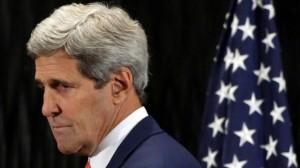Special to WorldTribune.com
JERUSALEM — The Hamas war has highlighted the steady decline in relations between Israel and the United States.
Officials and analysts agreed that the U.S.-led mediation to end the Gaza war damaged relations with both Israel as well as longtime Arab allies. They said President Barack Obama sided with Hamas’ main supporters, Qatar and Turkey, to force Israel into a unilateral ceasefire amid Hamas rocket and tunnel attacks.

“We never thought it would be the Americans who would lead the pressure,” Israeli Housing Minister Uri Ariel said. “Leave us alone. Go focus on Syria.”
Officials said Obama and Secretary of State John Kerry exploited the Israel-Hamas war to improve U.S. relations with Hamas supporters in the Middle East. They said the U.S. administration undermined an Egyptian ceasefire proposal to work with Iran, Qatar and Turkey.
“America harmed its allies in Israel, Egypt, and the Palestinian Authority by ignoring their demands and coming to the table with a plan that was not approved or even semi-approved by any of them,” Agriculture Minister Yair Shamir said.
Shamir, son of the late Prime Minister Yitzhak Shamir, said Washington, which allocated more than $3 billion in military aid for 2014, was losing credibility with Israel and other U.S. allies in the Middle East. In the end, the minister, said, Kerry’s ceasefire mission was sabotaged by Obama himself.
“Maybe it’s because they [Washington] have a problem with the regime in Egypt and they thought that by going through Turkey and Qatar, they’d be seen as an honest broker,” Shamir said. “But instead, they lost the allies that they had and didn’t get any new ones.”
Officials and analysts saw the Obama demand for an immediate ceasefire as part of Washington’s estrangement from Israel. They said the drift, marked by a drop in the export of combat platforms, began as soon as Obama entered office in 2009 and intensified during the U.S. reconciliation with Iran and its failed mediation effort with Israel and the Palestinian Authority in 2013. The quiet sanctions were culminated by a U.S. decision to ban all flights to Israel for two days in late July in what a senator termed an “economic boycott.”
“The security of the citizens of Israel must come before our relations with the United States,” Israeli parliamentarian Eli Yishai, a former longtime Cabinet minister, said.
For the first time, Israel has been quietly supported by former Arab rivals, including Egypt and Saudi Arabia. In unprecedented criticism, former Saudi intelligence chief Prince Turki Al Faisal, who accused Qatar and Turkey of sabotaging the proposed ceasefire, blamed Hamas for civilian casualties in the Gaza Strip.
“Hamas is responsible for the slaughter in the Gaza Strip following its
bad decisions in the past, and the haughtiness it shows by firing useless
rockets at Israel, which contribute nothing to the Palestinian interest,”
Turki told the Saudi-owned A-Sharq Al Awsat daily on July 27. “The Hamas
rockets pose no threat to the Israeli occupation, even when they reach Tel
Aviv.”
Analysts said the harsh tone of the administration also stemmed
from U.S. dismay over Israel’s strategic relations with Asia, particularly
China and India. They cited unprecedented foreign investment in Israel,
particularly in the hi-tech sector, which reduced the prospect of an
economic boycott.
“Israel is a world leader in the development and manufacturing of small
and medium size satellites, and one of only seven countries that possess
such capabilities, as well as launching capabilities, enhancing its research
and development, industrial and intelligence capabilities,” Yoram Ettinger,
a former Israeli diplomat and investment consultant, said.
Still, officials remain concerned that Obama and Kerry would encourage
an American backlash against Israel. They cited the increase in
anti-Semitism in Europe and Turkey, expected to spill over into the United
States.
“The European countries must protect the Jews within their territory,”
Yoel Razvozov, chairman of parliament’s Absorption Committee, told European
Union diplomats on July 28. “Otherwise, terror will eventually reach you.”

You must be logged in to post a comment Login